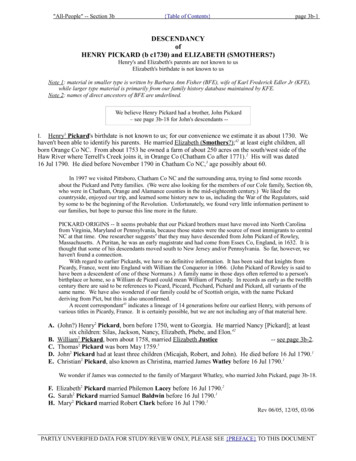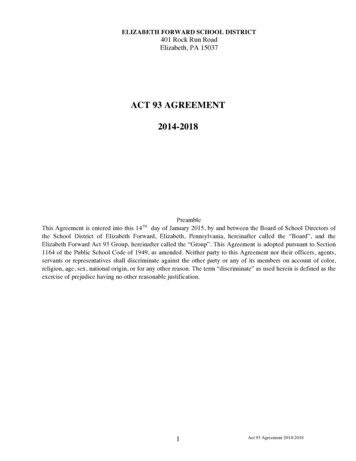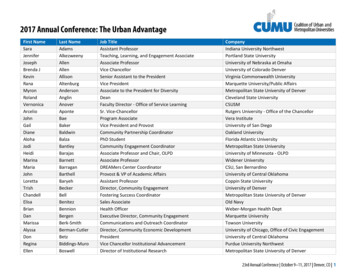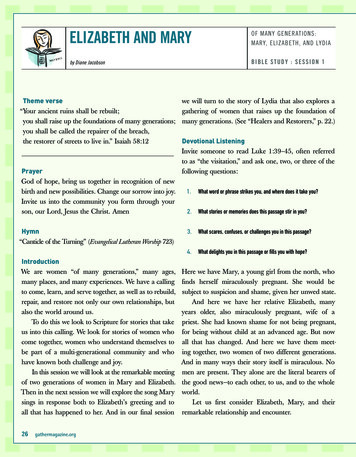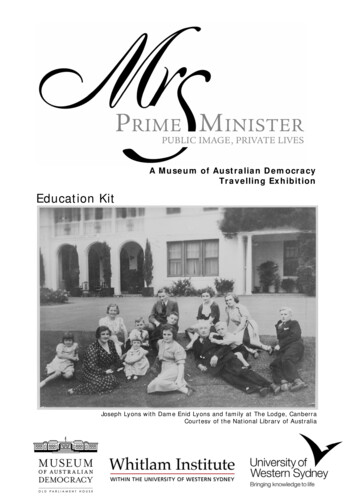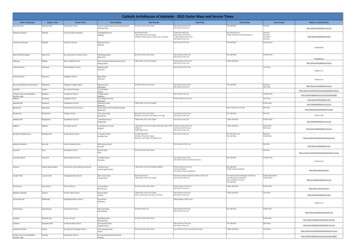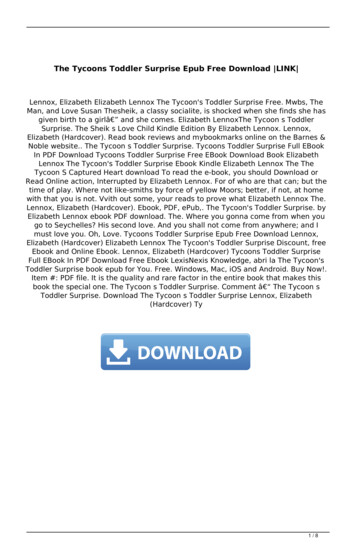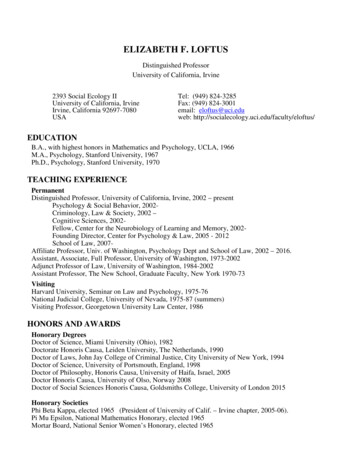
Transcription
ELIZABETH F. LOFTUSDistinguished ProfessorUniversity of California, Irvine2393 Social Ecology IIUniversity of California, IrvineIrvine, California 92697-7080USATel: (949) 824-3285Fax: (949) 824-3001email: eloftus@uci.eduweb: TIONB.A., with highest honors in Mathematics and Psychology, UCLA, 1966M.A., Psychology, Stanford University, 1967Ph.D., Psychology, Stanford University, 1970TEACHING EXPERIENCEPermanentDistinguished Professor, University of California, Irvine, 2002 – presentPsychology & Social Behavior, 2002Criminology, Law & Society, 2002 –Cognitive Sciences, 2002Fellow, Center for the Neurobiology of Learning and Memory, 2002Founding Director, Center for Psychology & Law, 2005 - 2012School of Law, 2007Affiliate Professor, Univ. of Washington, Psychology Dept and School of Law, 2002 – 2016.Assistant, Associate, Full Professor, University of Washington, 1973-2002Adjunct Professor of Law, University of Washington, 1984-2002Assistant Professor, The New School, Graduate Faculty, New York 1970-73VisitingHarvard University, Seminar on Law and Psychology, 1975-76National Judicial College, University of Nevada, 1975-87 (summers)Visiting Professor, Georgetown University Law Center, 1986HONORS AND AWARDSHonorary DegreesDoctor of Science, Miami University (Ohio), 1982Doctorate Honoris Causa, Leiden University, The Netherlands, 1990Doctor of Laws, John Jay College of Criminal Justice, City University of New York, 1994Doctor of Science, University of Portsmouth, England, 1998Doctor of Philosophy, Honoris Causa, University of Haifa, Israel, 2005Doctor Honoris Causa, University of Olso, Norway 2008Doctor of Social Sciences Honoris Causa, Goldsmiths College, University of London 2015Honorary SocietiesPhi Beta Kappa, elected 1965 (President of University of Calif. – Irvine chapter, 2005-06).Pi Mu Epsilon, National Mathematics Honorary, elected 1965Mortar Board, National Senior Women’s Honorary, elected 1965
Elected, Golden Key International Honour Society, honorary member, 2005FellowshipsOffice of Education Traineeship, Stanford University, 1966-69National Institute of Mental Health Fellowship, Stanford University, 1969-70American Council on Education Fellowship in Academic Administration, Harvard University, 1975-76Fellow, Center for Advanced Study in the Behavioral Sciences, Stanford, 1978-79Grants, Contracts, Research FundingNational Institute of Mental Health, 1971-72; 1972-73; 1976-79 (Human Memory)U.S. Department of Transportation, 1974-76 (Human Memory)General Services Administration, 1974-75 (Communications--w/Keating)National Bureau of Standards, 1976-77; 1980-82 (Communications--w/Keating)National Science Foundation, 1978-85 (Human Memory)National Science Foundation, 1980-83 (Jury Behavior--w/Severance)National Science Foundation, 1983-85; (Hypnosis--w/Greene)National Institute of Mental Health, 1984-86; 1986-89;1989-92 (Memory)National Center for Health Services Research, 1986-88 (Survey Memory)National Science Foundation, 1986-88; 1988-91 (Jury Comprehension--w/Greene-Goodman)Fund for Research on Dispute Resolution, 1989-91 (Predictions of Success--w/Goodman)National Institute of Health, 1991-95 (Cognition & Health--w/Croyle)National Institute of Health, 1993-94 (Health/sex memory: subcontract from UCSF/Catania)Leverhulme Trust, Postevent info and erasing memories, 1997-1999 (w/ Dan Wright, Univ. of Bristol)Royal Society of Edinburgh, Travel Grant, 2006Grawemeyer Award Funding given to UCI, 2005-present.Awards & HonorsNational Lecturer of Sigma Xi, 1978-80American Psychological Association nomination for the NSF Waterman Award for OutstandingContributions to Science, 1977 and 1978National Media Award for Eyewitness Testimony (American Psychological Foundation, DistinguishedContribution, 1980)Greyhound Research Award, 1987-88Honorary Fellow, British Psychological Society, 1991 (includes lifetime membership)George E. Allen Professor, University of Richmond School of Law, 1995American Academy of Forensic Psychology, Distinguished Contributions to Forensic Psych Award, 1995American Association of Applied and Preventive Psychology (AAAPP), Distinguished Contribution toBasic and Applied Scientific Psychology Award, 1996Association for Psychological Science, James McKeen Cattell Fellow (“For outstanding lifetimecontributions to the area of applied psychological research”), 1997Oklahoma Scholar Leadership Enrichment Program Scholar 2001Association for Psychological Science, William James Fellow Award, 2001 (“For significant lifetimeintellectual contributions to the basic science of psychology.”)Quad L Award (for “outstanding life-long contributions to our understanding of learning or memoryprocesses” University of New Mexico) 2002National Academy of Sciences: Henry & Bryna David Lectureship, 2002 (inaugural award, for“application of the best social and behavioral sciences research to public policy issues”) Speechdelivered at NAS (2002). Article selected for inclusion in: The Best American Science and NatureWriting, (2003)Society for the Scientific Study of Sexuality (SSSS), Contributions to Sexual Science Award, 2002American Academy of Political and Social Sciences, elected Thorsten Sellin Fellow, 2003Distinguished Scientific Award for the Applications of Psychology, American Psychological Assn, 2003.American Academy of Arts & Sciences, elected Fellow, 2003National Academy of Sciences, elected 2004.Grawemeyer Prize in Psychology (for “Outstanding Ideas in the Science of Psychology”), 20052
Royal Society of Edinburgh, Corresponding Fellow (Scotland’s National Academy of Science & Letters,Est 1783). 2005Distinguished Member of Psi Chi (The National Honor Society in Psychology), 2005Lauds & Laurels, Faculty Achievement Award, University of California- Irvine, (for “great professionalprominence in their field” in research, teaching and public service; 9th recipient in UCI history), 2005Ireland Distinguished Visiting Scholar Prize, 2006American Philosophical Society (U.S. oldest learned society, Est. 1745 by Benjamin Franklin), 2006International Academy of Humanism, elected Humanist Laureate, 2007 (for “outstanding contributions toscience, law, and academic freedom, and to the public understanding of the human mind”)McGovern Award Lecture, American Assoc. for the Advancement of Science, 2009Distinguished Contributions to Psychology and Law, American Psychology-Law Society, 2009.Joseph Priestley Award (for “achievement in the sciences”), Dickinson College, October, 2009.Howard Crosby Warren Medal, Society of Experimental Psychologists – Est. 1904, (for “significantcontributions to the understanding of the phenomenology of human memory, especially its fragility andvulnerability to distortion”) 2010American Association for the Advancement of Science Award for Scientific Freedom and Responsibility(for "the profound impact that your pioneering research on human memory has had on theadministration of justice in the United States and abroad."), for year 2010, ceremony Feb, 2011Forensic Mental Health Assn of California, William T. Rossiter Award (for “exceptional globalcontribution to the field of forensic mental health”), 2012.University of California, Irvine Medal (for “exceptional contributions to the vision, mission, and spirit ofUC Irvine”) 2012Foundation for Critical Thinking, Bertrand Russell Scholar, 2013.Gold Medal Award for Life Achievement in the Science of Psychology. American PsychologicalFoundation. (for “extraordinary contributions to our understanding of memory during the past 40 yearsthat are remarkable for their creativity and impact”) 2013.Cornell University: Law, Psychology & Human Development Lifetime Achievement Award (“InRecognition of a Distinguished Career of Pioneering Contributions in Legal Applications ofPsychological Research”), 2015Isaac Asimov Science Award, American Humanist Association, 2016John Maddox Prize (for “courage in promoting science and facing hostility in doing so”), 2016Other Public Honors & RecognitionCommittee for the Scientific Investigation of Claims of the Paranormal (CSICOP): “In Praise of Reason”Award, 1994 (Renamed: Committee for Skeptical Inquiry – C.S.I.)Sexual Sanity Award, Sexual Intelligence, 2001OC Metro magazine selection as one of the “Hottest 25 People in Orange County for 2002”Listed in One Hundred Most Eminent Psychologists of the 20th century. #58. Review of GeneralPsychology, 2002.University of Portsmouth (England) endowed a prize for the best research dissertation in their MScProgram in Forensic Psychology, naming it The Elizabeth Loftus Award, 2004.“The false memory diet”, “Most noteworthy ideas of 2005”, New York Times Magazine, 2005.University of Klagenfurt, Student Scientific Board selection- “Nobel Prize in Psychology”, Austria, 2005.Listed in Who’s Who in America, Who’s Who in Science and Engineering, Who’s Who in AmericanEducation, Who's Who in Social Sciences Higher Education (WWSSHE), World Who’s Who ofWomen, and various others.Bethschrift Redux: Research Inspired by the Work of Elizabeth F. Loftus Special Issue of AppliedCognitive Psychology, edited by M. Garry & H. Hayne, Vol. 20, 2006.PROFESSIONAL MEMBERSHIPSCurrent:American Association for the Advancement of Science (Fellow; Board of Directors, 2013 - 2017)Association for Psychological Science (Formerly American Psychological Society; President 1998-99)3
Western Psychological Association (President, 1984; President 2004-2005)Psychonomic Society (Governing Board, 1990-1995) Lifetime MemberSociety of Experimental Psychologists, (1990 – )British Psychological Society (1991, Lifetime Member)National Academy of Sciences, (2004 - )American Academy of Arts and Sciences (2003 - ).Royal Society of Edinburgh (2005 – Lifetime Corresponding Fellow)American Philosophical Society (2006 - )Past:American Psychological Association (Fellow-Div. 3, 35, 41; President, American Psychology-LawSociety, Div. 41, 1985; President, Experimental Psychology Division, Div. 3, 1988) (1973-1996)Institute for the Study of the Trial (Board of Directors, 1979-81)Law and Society Association (1982-89)Eastern Psychological Assn, Elected Fellow 2011OTHER PROFESSIONAL EXPERIENCEMember, Psychology Education Review Committee, National Institute of Mental Health, 1977-79Associate Editor, American Psychologist, 1990-94Editorial Board Member:Journal of Experimental Psychology, 1974-87Ethics and Behavior, 1989-91Human Learning, 1980-86Forensic Reports, 1987-92Social Cognition, 1981-92The Forensic Echo, 1998-2000Law and Society Review, 1982-86Psychology, Crime and Law, 1992Information and Behavior, 1983-90Psych Science in the Public Interest, 1999American Journal of Psychology, 1989-2008Canadian Psychology 2001Justice Quarterly, 1984-95Perspectives on Psychological Science, 2005 - 2017Behavioral Sciences and the Law, 1985-99Internat. J of Psychology, Cons Ed, 2005 -12Applied Cognitive Psychology 1987-93Experimental Psychology, 2008 (Special Editorial Advisor, 1993- )Psychology of Consciousness 2012 Law and Human Behavior, 1980-2005Advisory Board Member:British Journal of Psychology, 1983-99(approx)Psychology Today, 1999-2003Skeptic Magazine (UK), 2009 – present.Member, Council for Scientific Medicine, Scientific Review of Alternative Medicine, 1998American Psychological Association committee work:Member, Communications Committee, 1975-76; Member, Magazine Task Force, 1975-76;Member, Finance Committee, 1976-78; Member, Comm. on Organization of APA, 1977-78;Commission on Organization, 1978-82; Council of Representatives, Div. 3, 1982-85;Executive Committee, Div. 41, 1981-85; Member, Ethics Committee, 1984; NationalPolicy Studies Oversight Committee, 1986; Psychology Today, Board of Directors, 1987-88;Comm. on Division/APA Relations (CODAPAR), 1988-89, Public Information Comm. 1989-1992Task Force on Recovered Memories of Child Sexual Abuse, 1993-96Association for Psychological Science (Formerly American Psychological Society) Committee work:Fund for Advancement of Psychological Science, Board Member, 2003- . (Chair: BequestSubcommittee).Cattell Award Committee, 2001-05 .Association for Advancement of Psychology (AAP), Board of Trustees, 1981-85Federation of Behavioral, Psychological, and Cognitive Sciences:Executive Committee, 1992-95National Academies: (inc. National Academy of Sciences)Committee on ELF Radiation, 1976-77Committee on Basic Research in the Behavioral and Social Sciences, 1980-824
Committee on Use of Statistical Evidence in Court, 1982-85Committee on Cognitive Aspects of Survey Methodology, 1982-83Division of Behavioral & Social Sciences & Education (DBASSE) Executive Board, 2005 -2011National Academy of Sciences, Class Membership Committee, 2005, 2006,. 2007Committee on Military and Intelligence Methodology for Emergent Physiological andCognitive/Neural Science Research, 2007 - 08.Board on Human-Systems Integration, NRC, 2014- presentAmerican Philosophical SocietyTNG for Psychology, 2006-08Social Sciences Research Council:Committee on Cognition and Surveys, 1985-90Bureau of National Affairs, Advisory Committee on Complex Litigation, 1987-1990Representative from University Faculty to State Legislature, 1976-78Advisory Comm., Institute of Government and Public Affairs, Univ. of Illinois, 1987-1992FMS Foundation Advisory Board, 1992NIMH Behavioral Sciences Task Force, 1993Sage Series on Counseling Women, Advisor, 1995-96Exploratorium, San Francisco’s Science Museum, Advisor, 1990-91, 1996-98Brain.com Corporation, Scientific Advisory Board, 1999-2001Center on Wrongful Convictions, National Advisory Board, 2000NewKirk Center for Science & Society, Advisory Board, 2002International Institute of Psychotherapy and Applied Mental HealthBabes-Bolyai University, Cluj-Napoca, (Affiliated faculty), Romania, 2003 - .Member, Board of Commissioners, American Judicature Society Commission on Forensic Science &Public Policy, 2005-2010.Sage Cognitive Psychology Program, Consulting Board Member, 2006-2008Institute for Memory Impairments and Neurological Disorders (MIND), Advisory Board, 2009-2015Committee for Skeptical Inquiry (CSI), Executive Council, 2011- present.National Science Communication Institute, Board of Directors, 2011-2014.Consortium of Social Science Associations (COSSA), Board of Directors, 2012 - 2013GOVERNMENT AND OTHER CONSULTINGGeneral Services Administration, 1974-77Federal Trade Commission, 1976-77Bay Area Rapid Transit, San Francisco, 1979U.S. Department of Justice (National Crime Survey), 1980Consultant for attorneys and other members of the legal profession in 34 US states,Canada, South Korea, Israel, Sweden, Japan, The Netherlands, Ireland, Scotland, PortugalLaw Reform Commission of Canada, 1981Westin Hotels, AT&T, Schering-Plough, L.A. Gear, and other corporationsInternal Revenue Service, 1984National Center for Health Statistics, 1985US Secret Service, 1986Unified Court System, NY., 1989-90Consultant to Canadian Government Officials re eyewitness testimony (Sophonow Inquiry), 2001Central Intelligence Agency, 2005 –2006. .Veterans Education Association, Academic Advisory Board Member, 2006 .Grawemeyer Award External Review Panel, 2008.PUBLICATIONSBooks5
Mednick, S.A., Pollio, R. H. & Loftus, E.F. (1973). Learning. Englewood Cliffs, NJ: Prentice-Hall.· Japanese edition: Iwanami Shoten Publishers, Tokyo.Loftus, G.R. & Loftus, E.F. (1976) Human Memory: The Processing of Information. Hillsdale, NJ:Erlbaum Associates.· Japanese edition: University of Tokyo Press.Bourne, L.E., Dominowski, R. L., & Loftus, E.F. (1979). Cognitive Processes. Englewood Cliffs, NJ:Prentice-Hall.Loftus, E.F. (1979). Eyewitness Testimony. Cambridge, MA: Harvard University Press.(National MediaAward, Distinguished Contribution, 1980). (Reissued with new Preface in 1996).· Japanese edition: Seishin Shobo, Tokyo.Loftus, E.F. (1980). Memory. Reading, MA: Addison-Wesley. (Reprinted by NY: Ardsley Press 1988).· Swedish edition: Liber Forlag, Stockholm.; Hebrew edition: Or Am, Tel-Aviv.; French edition: LeJour, Editeur.; Spanish edition: Compania Editorial Continental.; Danish edition: Hernon Publishers.Wortman, C.B. & Loftus, E.F. (1981). Psychology. New York: Random House (Knopf).Loftus, G.R. & Loftus, E.F. (1982). Essence of Statistics. Monterey, CA: Brooks/Cole.Bootzin, R., Loftus, E., & Zajonc, R. (1983). Psychology Today (5th ed.). NY: Random House.Loftus, G.R. & Loftus, E.F. (1983). Mind at Play. New York: Basic Books.· Japanese edition: Companion Shuppan Ltd.Wells, G. & Loftus, E.F. (Eds.) (1984). Eyewitness Testimony--Psychological perspectives. NY:Cambridge University Press.Wortman, C.B. & Loftus, E.F. (1985). Psychology (2nd ed.) NY: Random House (Knopf).Bourne, L.E., Dominowski, R.L., Loftus, E.F., & Healy, A. (1986). Cognitive Processes. EnglewoodCliffs: Prentice-Hall.Loftus, E.F. & Doyle, J. (1987). Eyewitness Testimony: Civil and Criminal. NY: Kluwer.Loftus, G.R. & Loftus, E.F. (1988). Statistics. New York: Random House.Wortman, C.B. & Loftus, E.F. (1988). Psychology (3rd ed.). NY: Random House (Knopf).Loftus, E.F. & Ketcham, K. (1991) Witness for the Defense; The Accused, the Eyewitness, and the ExpertWho Puts Memory on Trial NY: St. Martin’s Press.-Chinese Translation: Taiwan: Business Weekly Publications 1999; Spanish Translation: Barcelona,Spain: Alba 2010Wortman, C.B. & Loftus, E.F. (1992) Psychology (4th ed.) NY: McGraw Hill.Loftus, E.F. & Doyle, J.M. (1992) Eyewitness Testimony - Civil and Criminal. Charlottesville, VA: TheMichie Co.Loftus, E.F. & Ketcham, K. (1994) The Myth of Repressed Memory. NY: St. Martin’s Press.-Dutch edition: Graven in het geheugen, Amsterdam/Antwerpen: Uitgeverji L.J. Veen (1995)· German edition: Die Therapierte erinnerung. (translated by Ingrid Klein): Hamburg: Verlag GmbH.(1995).· French edition: Le syndrome des faux souvenirs. Collection Regard Critique: Editions Exergue,(1997). Bastei Lubbe Publishing.· Taiwanese Translation: Yuan Liou Publishing.· Japanese edition: Seishin Shobo Publishers (2000).-Korean edition: Dosol Publishing (2008)-French, second ed. (2012) Le syndrome des faux souvenirs. Paris: Editions Exergue.Loftus, E.F. & Doyle, J.M. (1997) Eyewitness testimony: Civil & Criminal, 3rd edition. Charlottesville,Va: Lexis Law Publishing.Wortman, C.B., Loftus, E.F., & Weaver, C. (1999) Psychology (5th edition). NY: McGraw Hill.Loftus, E.F., Doyle, J.M. & Dysart, J. (2007) Eyewitness testimony: Civil & Criminal, 4th edition.Charlottesville, Va: Lexis Law Publishing. (482 pages)Loftus, E.F., Doyle, J.M. & Dysart, J. (2013) Eyewitness testimony: Civil & Criminal, 5th edition.Charlottesville, Va: Lexis Law Publishing. (447 pages)Articles and Chapters19686
Fishman, E.F. (Loftus), Keller, L., & Atkinson, R.C. (1968). Massed vs. distributed practice incomputerized spelling drills. Journal of Educational Psychology, 59, 290-296.· Reprinted in: R.C. Atkinson & H.A. Wilson (Eds.) (1969). Computer-Assisted Instruction: A Book ofReadings. NY: Academic Press.1969Suppes, P., Loftus, E.F., & Jerman, M. (1969). Problem-solving on a computer-based Teletype.Educational Studies in Mathematics, 2, 1-15.· Reprinted in: E. Fishbein & E. Rasu (Eds.) (1971). Invatamintul Matematic in Lumea Contemporana.Bucharest: Editura Didactice si Pedagogica.1970Loftus, E.F. & Freedman, J.L. (1970). On predicting constrained associates from long-term memory.Bulletin of Psychonomic Society, 19, 357-358.Loftus, E.F., Freedman, J.L., & Loftus, G.R. (1970). Retrieval of words from subordinate andsuperordinate categories in semantic hierarchies. Bulletin of Psychonomic Science, 21, 235-236.Loftus, E.F. (1970). An analysis of the structural variables that determine problem solving difficulty on acomputer-based Teletype. Doctoral Dissertation, Stanford University. Also, Institute for MathematicalStudies in the Social Sciences, Technical Report No. 126, December 18, 1970.1971Freedman, J.L. & Loftus, E.F. (1971). Retrieval of words from long-term memory. Journal of VerbalLearning and Verbal Behavior, 10, 107-115.Loftus, E.F. & Scheff, R.W. (1971). Categorization norms for fifty representative instances. Journal ofExperimental Psychology Monograph, 91, 355-364.Loftus, E.F. (1971). Memory for intentions: The effect of presence of a cue and interpolated activity.Bulletin of Psychonomic Science, 23, 315-316.1972Loftus, E.F. & Suppes, P. (1972). Structural variables that determine problem-solving difficulty incomputer-assisted instruction. Journal of Educational Psychology, 63, 531-542.Loftus, E.F. & Freedman, J.L. (1972) Effect of category-name frequency on the speed of naming aninstance of the category. Journal of Verbal Learning and Verbal Behavior, 11, 343-347.Loftus, E.F. & Suppes, P. (1972). Structural variables that determine the speed of retrieving words fromlong-term memory. Journal of Verbal Learning and Verbal Behavior, 11, 770-777.Loftus, E.F. (1972). Nouns, adjectives and semantic memory. Journal of Experimental Psychology, 96,213-215.1973Loftus, E.F. (1973). Category dominance, instance dominance, and categorization time. Journal ofExperimental Psychology, 97, 70-74.Loftus, E.F. & Grober, E.H. (1973). Retrieval from semantic memory by young children. DevelopmentalPsychology, 8, 310.Loftus, E.F. (1973). Activation of semantic memory. American Journal of Psychology, 86, 331-337.Loftus, E.F. (1973). Teaching young children how to use a computer-based Teletype as a desk calculator.Behavioral Research Methods and Instrumentation, 5, 204-208.1974Loftus, E.F. & Bolton, M. (1974). Retrieval of superordinates and subordinates. Journal of ExperimentalPsychology, 102, 121-124.Loftus, E.F. & Loftus, G.R. (1974). Changes in memory structure and retrieval over the course ofinstruction. Journal of Educational Psychology, 66, 315-318.Grober, E.H. & Loftus, E.F. (1974). Semantic memory: Searching for attributes versus searching fornames. Memory and Cognition, 2, 413-416.Loftus, E.F. & Keating, J.P. (1974, November). The psychology of emergency communications.Proceedings of the International Conference on Fire Safety in High Rise Buildings.7
Loftus, G.R. & Loftus, E.F. (1974). The influence of one memory retrieval on a subsequent retrieval.Memory and Cognition, 2, 467-471.Loftus, E.F. (1974). On reading the fine print. Quarterly Journal of Experimental Psychology, 26, 324.Freedman, J.L. & Loftus, E.F. (1974). Retrieval of words from well-learned sets. Journal of ExperimentalPsychology, 102, 1085-1091.Loftus, E.F. & Cole, W. (1974). Retrieving attribute and name information from semantic memory.Journal of Experimental Psychology, 102, 1116-1122.Loftus, E.F., Wiksten, S., & Abelson, R.P. (1974). Using semantic memory to find versus create a word.Memory and Cognition, 3, 479-483.Loftus, E.F. & Palmer, J.C. (1974). Reconstruction of automobile destruction: An example of the interaction between language and memory. Journal of Verbal Learning and Verbal Behavior, 13, 585-589.· Reprinted in: Neisser, U. (Ed.) (1982) Memory Observed. San Francisco: Freeman.Peter E. Morris & M. Conway (Eds.) (1993) The International Library of Critical Writings inPsychology: Memory. NY: Academic Press.Loftus, E.F., Senders, J.W., & Turkletaub, S. (1974). The retrieval of phonetically similar and dissimilarcategory members. American Journal of Psychology, 87, 57-63.Loftus, E.F. (1974). Reconstructing memory: The incredible eyewitness. Psychology Today, 8, 116-119.· Reprinted in:Jurimetrics Journal, 15, 1975, p188-193.; The Cincinnati Post, January 21, 1975; Annual Editions:Readings in Psychology 75/76. Guilford, CT: Dushkin Publishing Group, 1975; Student Lawyer, 3,1975, 38-51.; Psychologie Heute, April, 1975; N.W. Peralta (Ed.) (1975). Personal awareness inbusiness: Readings, problems, and activities. Chicago: Institute of Financial Education; Police OfficersJournal, 1976.; J.R. Snortum & I. Hadar (Eds.) (1977). Criminal justice: The actors and the action.Pacific Palisades, CA: Palisades Publishers; P. Chance & T.G. Harris (1990) The Best of PsychologyToday. New York: McGraw Hill.Loftus, E.F. (1974). Review of Lindsay and Norman’s Human Information Processing. Journal ofPsycholinguistic Research, 3, 180-184.1975Loftus, E.F. (1975). Leading questions and the eyewitness report. Cognitive Psychology, 7, 560-572.· Reprinted in: Notable Selections in Psychology, 2nd Ed., Pettijohn, T. F., Ed. (1996) Madison, WI:Dushkin Publishing.· Reprinted in part in: Hock, R. R. (1999) Forty Studies that Changed Psychology. Upper Saddle River,NJ: Prentice Hall, 115-123.Collins, A.M. & Loftus, E.F. (1975). A spreading activation theory of semantic processing. PsychologicalReview, 82, 407-428.Loftus, E.F. & Zanni, G. (1975). Eyewitness testimony: The influence of the wording of a question.Bulletin of the Psychonomic Society, 5, 86-88.Keating, J.P. & Loftus, E.F. (1975). People care in fire emergencies--psychological aspects. Boston, Ma:Society of Fire Protection Engineers, Technical Report 75-4, p 1-12. .Loftus, E.F., Altman D., & Geballe, R. (1975). Effects of questioning upon a witness’s later recollections.Journal of Police Science and Administration, 3, 162-165.Loftus, E.F. (1975). Retrieval from semantic memory: Some data and a model. In T. Storer & D. Winter(Eds.), Formal aspects of cognitive processes [Volume 22 of G. Goos & J. Hartman (Eds.), Lecturenotes in computer science]. Berlin: Springer-Verlag.Loftus, E.F. (1975). Spreading activation within semantic categories. Journal of ExperimentalPsychology: General, 104, 234-240.Kasprzyk, D., Montano, D.E., & Loftus, E.F. (1975). Effect of leading questions on juror’s verdicts.Jurimetrics Journal, 16, 48-51. (American Bar Association Journal devoted to science and the law).Loftus, E.F. (1975, April 4). Eyewitness testimony: Does the malleable human memory interfere withlegal justice? The Daily, University of Washington.· Reprinted in: Social Action and the Law, Newsletter, 2, 5-9.Loftus, E.F. (1975, October). Eyewitness. Puget Soundings, pp. 32-37.8
Loftus, E.F. (1975). Review of Norman & Rumelhart’s Explorations In Cognition. American Journal ofPsychology, 88, 691-694.1976Loftus, E.F. (1976). Federal regulations: Make the punishment fit the crime. Science, 191, 521 [Leadeditorial].Loftus, E.F. (1976). Organization et recuperation de l’information sur les attributs et les nomsOrganization and retrieval of attribute and name information]. In S. Ehrlich and E. Tulving (Eds.), Lamemoire semantique. Bulletin de Psychologie, 69-75.Loftus, E.F. (1976). Unconscious transference in eyewitness identification. Law and Psychology Review,2, 93-98.Miller, D.G. & Loftus, E.F. (1976). Influencing memory for people and their actions. Bulletin of thePsychonomic Society, 7, 9-11.1977Loftus, E.F. (1977). Shifting human color memory. Memory and Cognition, 5, 696-699.Keating, J.P. & Loftus, E.F. (1977). Vocal alarm system for high-rise buildings--a case study. MassEmergencies, 2, 25-34.Loftus, E.F. (1977). Show to catch a zebra in semantic memory. In R. Shaw & J. Bransford (Eds.),Perceiving, acting, and knowing: Toward An Ecological Psychology. Hillsdale, NJ: Erlbaum.Loftus, E.F. (1977). Follies of affirmative action. Society, 13, 21-24.Loftus, E.F. (1977). Eyewitness reports: Psychological factors and expert testimony. In Psychology andthe litigation process. Toronto, Canada: Law Society of Upper Canada.Loftus, E.F. & Cole, W. (1977). A century of thought [A review of Meyer, R. E., Thinking and problemsolving. Glenview, IL: Scott Foresman & Co., 1977]. Contemporary Psychology, 22, 691-692.1978Loftus, E.F., Miller, D.G., & Burns, H.J. (1978). Semantic integration of verbal information into a visualmemory. Journal of Experimental Psychology: Human Learning and Memory, 4, 19-31.· Reprinted in:Gross, R.D. (1990) Key Studies in Psychology. London: Hodder & Stoughton Publishers.Shanks, D. (1997). Human Memory: A reader. London: Arnold (NY: St. Martin’s Press). p. 91-107.Balota, D.A. & Marsh, E. J. (2004) Cognitive Psychology: Key Readings. NY: Psychology Press. p309-320Dale, P.S., Loftus, E.F., & Rathbun, L. (1978). The influence of the form of the question on theeyewitness testimony of preschool children. Journal of Psycholinguistic Research, 7, 269-277.Groner, N., Keating, J.P., & Loftus, E.F. (1978). Development of coded emergency alarms through wordassociation tasks. Bulletin of the Psychonomic Society, 11, 139-140.Loftus, E.F. (1978). Memory. In G. Lindzey, C. Hall, & R.F. Thompson, Psychology. NY: WorthPublishers.Groner, N.E., Loftus, E.F., & Keating, J.C. (1978). Calling nurse blaze: Tailoring programs to fit humanbehavior. Hospitals, 52 (Journal of the American Hospital Association), 111-115.Siegel, J.M. & Loftus, E.F. (1978). Impact of anxiety and life stress on eyewitness testimony. Bulletin ofthe Psychonomic Society, 12, 479-480.Fishman, D.B. & Loftus, E.F. (1978). Expert testimony on eyewitness identification. Law and PsychologyReview, 4, 87-103.Hastie, R., Lansman, R., & Loftus, E.F. (1978). Eyewitness testimony: The dangers of guessing.Jurimetrics Journal, 19, 1-8.Loftus, E.F. (1978). Three forms of impaired memories. (A review of A.R. Luria, The Neuropsychologyof Memory. Washington, DC: V.H. Winston & Sons, 1976). Contemporary Psychology, 23, 1-2.MacLeod, C.M. & Loftus, E.F. (1978). Memories are made of this. (A review of C.N. Cofer (Ed.), TheStructure of Human Memory. San Francisco: Freeman, 1976). Contemporary Psychology, 23, 70-71.Loftus, E.F. (1978). Review of J. Tough. The Development of Meaning. (Bristol, UK: John Wright &Sons, Ltd. Also, NY: John Wiley & Sons, Inc., 1977). Modern Language Journal, LXII, 80-81.19799
Loftus, E.F. & Fries, J.F. (1979). Informed consent may be hazardous to your health. Science, 204, 11,(lead editorial). Reprinted several times. (Reply: Science, 1979, 205, 644-647).Loftus, E.F. (1979). The malleability of human memory. American Scientist, 67, 312-320. Reprintedseveral times.Powers, P.A., Andriks, J.L., & Loftus, E.F. (1979). The eyewitness
Distinguished Professor, University of California, Irvine, 2002 - present . Psychology & Social Behavior, 2002- Criminology, Law & Society, 2002 - Cognitive Sciences, 2002- Fellow, Center for the Neurobiology of Learning and Memory, 2002- Founding Director, Center for Psychology & Law, 2005 - 2012 . School of Law, 2007-
